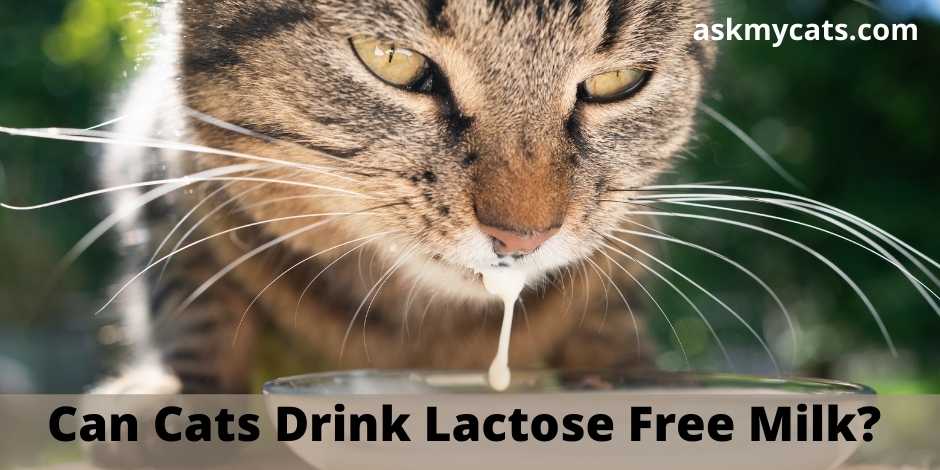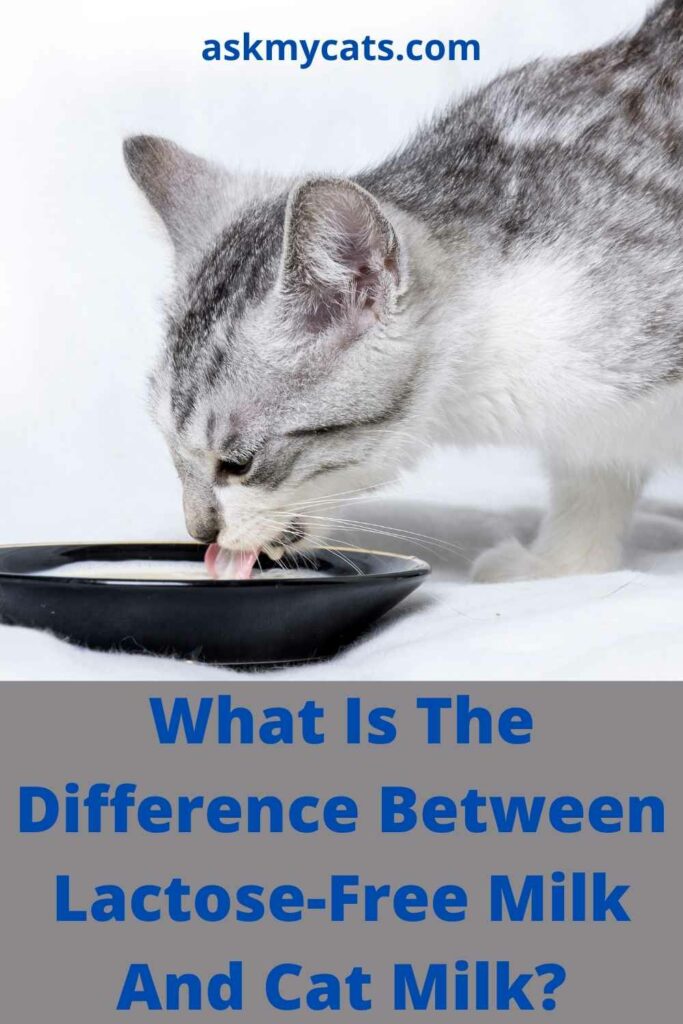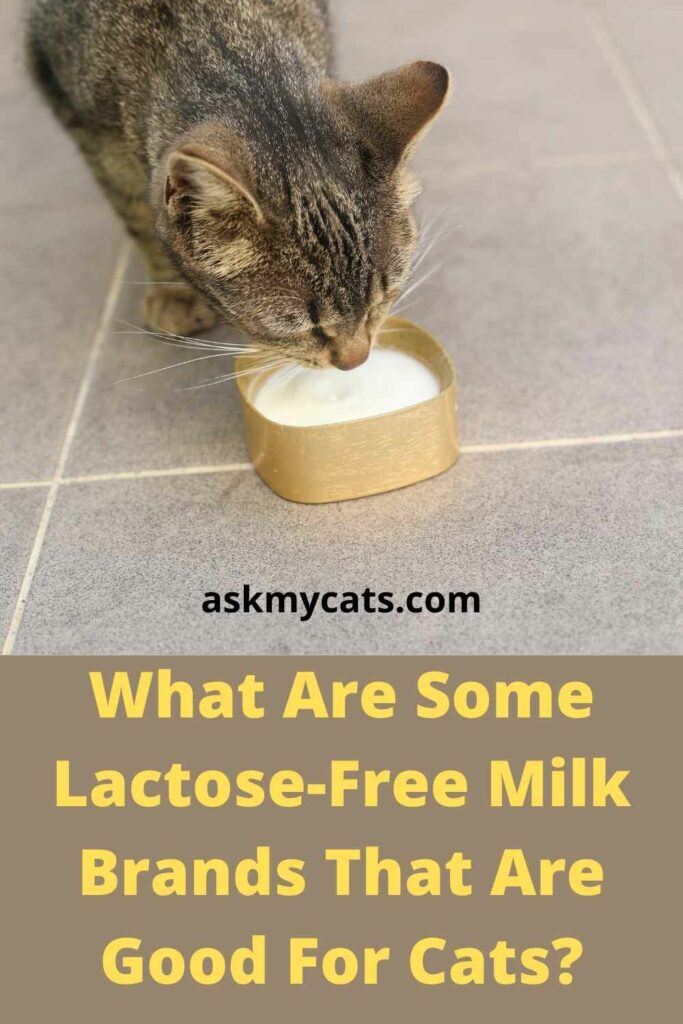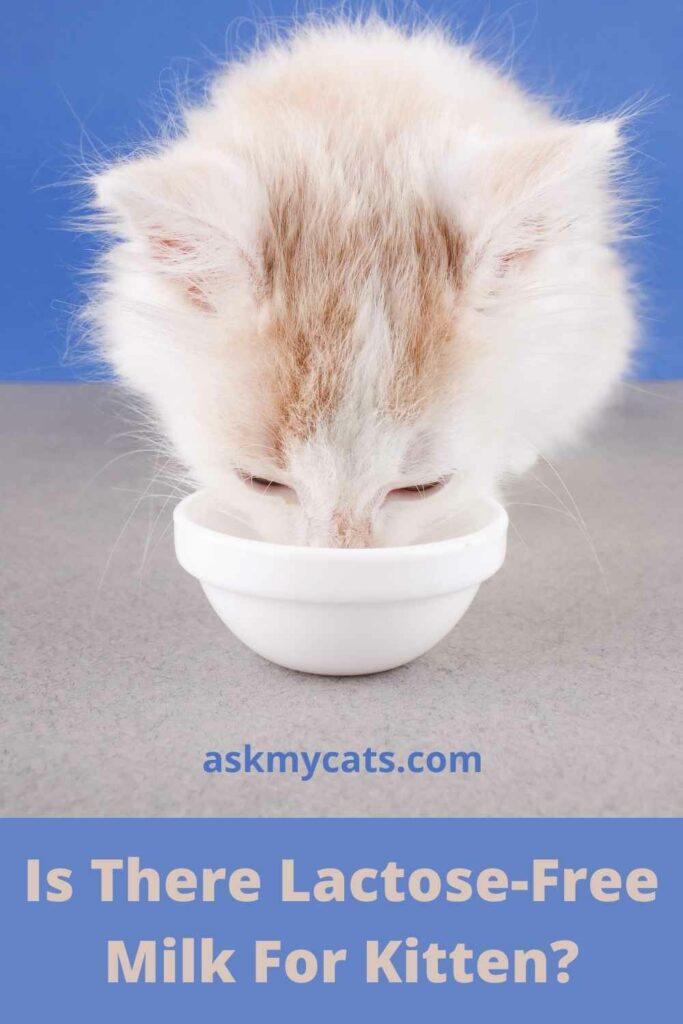While many cat parents believe that their feline companion would appreciate a glass of milk now and then, dairy products from cows may be harmful to her health. In reality, most cats are unable to digest dairy products.
However, you may be wondering if your cat can consume lactose-free milk. You may also wonder if it is healthy for her health.
Yes, cats can drink lactose-free milk. You may offer lactose-free milk to your cat. It’s available at a variety of pet and supermarket stores.
In this article, we’ll discuss everything you need to know about cats and lactose-free milk.


Give Your Cat the Perfect Day
Get the Free Ebook!
Why Is Milk Bad for My Cat?
Many cats, like some people, are lactose intolerant. This indicates that they lack the enzymes required to digest lactose.
Lactose is a kind of sugar found in dairy products. Cats generally are unable to digest lactose which makes milk harmful to their health.
Undigested lactose may linger in your cat’s stomach rather than being absorbed into her circulation. That may ferment due to internal bacteria and cause a number of health issues for your cat.
Your cat may suffer from a slew of gastrointestinal issues for your pet, including vomiting and diarrhea.
While lactose intolerance does not affect all cats, it does affect the majority of them. This is why it’s vital to avoid giving your cat dairy products like cheese and milk.
Will Lactose-Free Milk Hurt Cats?
Lactose-free milk is a dairy product that has had all of the lactose removed and the enzymes required to break down the sugar added.
Individuals suffering from lactose sensitivity may drink lactose-free milk. This might lead you to wonder if your cat can drink it too.
Yes, as long as the lactose-free milk is specifically made for cats, cats may consume it. It should, however, be given in moderation since, while it hydrates your cat, it also includes a lot of calories.
It’s only for occasional or supplemental feeding, and it’s not meant to be a major part of your cat’s everyday diet.
While a tiny bowl of lactose-free milk might be a nice treat for your cat on occasion, you shouldn’t feed it to her on a daily basis. Water is always beneficial for cats, no matter how boring it may appear.
Check out more details about can cats have whipped cream
Can Cats Digest Lactose-Free Milk?
Giving any sort of milk to an adult cat is generally not a smart idea. You can, however, occasionally offer your cat lactose-free milk as a treat.
Lactose-free milk is a simple substitute for actual milk. It helps alleviate some of the unpleasant effects that actual milk possesses.
Lactose-free milk is simpler to accept for cats with lactose intolerance since it has additional lactase, making it a viable alternative to normal milk.
Can I Give Milk To My Cat Even Though I’m Not Sure If She Is Lactose-Intolerant?
When you want to offer your cat milk or dairy treats but aren’t sure if she’ll accept it, start with a tiny amount of milk.
Give her a spoonful or two of milk and keep an eye on her for symptoms such as vomiting and diarrhea. If there are no symptoms, your feline may be okay with a small amount of milk. However, make sure you give it on occasion as a treat.
To further reduce intolerance responses, consider feeding her a little sprinkle of cheese or a tablespoon of yogurt. However, keep in mind that dairy and milk substitutes are not a substitute for a well-balanced diet.
These items add calories, protein, and fat to your cat’s diet, so make sure to include them in her daily calorie intake to avoid overfeeding and health problems like diabetes.
Can Cats Drink Lactose-Free Milk For Humans?
Lactose-free milk is acceptable for your cat to drink. However, other milk substitutes, such as almond milk and soy milk, may cause problems in your feline
The carbohydrate-metabolizing enzymes required to efficiently break down and digest the plant-based proteins contained in soy are not present in a cat’s delicate digestive tract. As a result, your cat will be unable to accept soy milk.
Almond milk, on the other hand, might be harmful to your cat. While the high fat and oil content isn’t harmful, it might induce gastrointestinal issues including vomiting and diarrhea. Almonds can also lead to pancreatitis in cats.
While goat milk is comparable to cow milk, it has less lactose. According to certain research, it is also more digestible than cow milk. If your cat is lactose intolerant, though, avoid giving her goat milk.
Lactose-intolerant people can benefit from the various forms of milk available, such as soy milk and almond milk. However, due to the sugar level, they are not suitable for a cat’s digestive system.
You might also like to read about can cats drink goat milk
Can Cats Drink Lactaid Milk?
Lactose, a sugar found in milk, causes digestive problems in many cats. Lactaid, on the other hand, is lactose-free milk and should not create any problems.
Lactaid milk is suitable for lactose-intolerant cats. Of course, common sense dictates that you begin with a little amount and monitor her body’s reaction.
While it’s a popular misconception that cats can drink milk, this is not true. If you insist on giving your cat milk, choose a lactose-free product developed specifically for cats, and make sure they have enough water.
What Is The Difference Between Lactose-Free Milk And Cat Milk?

Lactose-free milk is made with lactase, an enzyme that aids in the digestion of lactose. Lactose-free milk may be substituted for ordinary milk in any recipe since it has a similar flavor, texture, and nutritional profile.
Although lactose-free milk is better for your cat’s stomach than regular milk, it’s still not a good idea to feed it to them. Lactose-free milk’s nutritional characteristics aren’t compatible with your cat’s dietary requirements.
Cat Milk has a lower lactose content and is good for animals. Unlike regular milk, it has been specifically designed by renowned nutritionists and veterinarians to have less than 0.2 percent lactose.
Because most cats are lactose intolerant, giving them cow’s milk can be dangerous to their health. Commercial “cat milk” is better than regular milk if you truly want to give your cat milk.
If you want to learn more about cat milk, check out our other article, “Can Humans Drink Cat Milk?”.
Because of the increased fat and sugar content, you should avoid providing full cow’s milk or cream to cats.
What Are Some Lactose-Free Milk Brands That Are Good For Cats?

Here are some lactose-free milk products that dietitians have created specifically for cats:
1. Whiskas Cat Milk
Because it contains ninety-eight percent less lactose than ordinary milk, this natural milk product is ideal for lactose-intolerant cats. It’s safe and simple to digest, making it perfect for cats with sensitive stomachs.
It’s packed with vitamins and minerals, as well as calcium for strong teeth and bones. This is generally given to cats as a treat or in addition to their normal meals.
Ingredients include, but are not limited to, milk, water, non-fat milk, malt extract, lactase, taurine, and corn syrup solids.
2. Cat Sip Real Milk
This product, like Whiskas Cat Milk, is suitable for lactose-intolerant cats who can’t digest normal cow’s milk. It’s prepared using Grade A milk that’s one percent low-fat and ultra-pasteurized.
Cat Sip is lactose-free and enriched with taurine, which is healthy for both your cat and your dog’s health.
Can Kittens Drink Milk?
Milk may be safely digested by kittens until they are weaned. They lose the enzymes needed to digest lactose at the age of eight weeks.
Dairy isn’t the greatest choice for a kitten even as a baby. This is especially true if you’re still bottle-feeding an unweaned kitten.
Instead, go to your local pet store and get kitten formula or a mother’s milk replacer. Both of these products provide the vitamins and minerals that your cat needs.
Is There Lactose-Free Milk For Kitten?

Lactose-free milk is less likely to induce stomach distress and can be used in an emergency. Of course, you’ll want to take your kitten to the vet as soon as possible to start her on formula.
Lactose-free milk is not suitable for kittens. Because they were not meant to ingest milk from other animals, most cats are lactose intolerant.
Although kittens may tolerate their mother’s milk, the great majority of cats cannot tolerate normal cow’s milk.
Humans have been drinking cow’s milk for numerous generations, yet many individuals still can’t tolerate it, which is why there are so many different brands and varieties of lactose-free milk.
The digestive tract of a cat is even less used to milk, and the notion that cats require milk must be dispelled.
If your kitten is still young and needs its mother’s milk, you can try a kitten-specific milk replacer.
Cat milk replacers, which are sold by veterinarians or in pet stores, often include cow’s milk that has been changed to mimic the nutritional makeup of cat’s milk as precisely as possible.
Milk replacers made particularly for kittens are a great option if you’re fostering or parenting an orphaned kitten.
What Happens If A Cat Drinks Lactose-Free Milk?
While a tiny amount of lactose-free milk might be a nice treat for your cat on occasion, you shouldn’t feed it to her on a daily basis. Water is always beneficial for cats, no matter how boring it may appear.
While you may believe that milk is a nice treat for our cats, and even a fantastic source of nutrition, milk is really harmful to them.
While lactose-free milk is safe, it lacks the critical elements that your cat requires.
Your feline companion will be completely healthy if you feed her a proper diet of high-quality cat food and enough water, and you may skip the milk.
Frequently Asked Questions
Will Lactose-Free Milk Hurt Cats?
Milk is no longer regarded as a nutritious beverage for cats. Lactose intolerance affects the majority of cats, which means they can’t digest the lactose (sugar) in milk. Cats may consume lactose-free milk as it is safe for them.
What Are The Symptoms Of Lactose Intolerance In Cats?
Lactose intolerance is quite typical in cats. If your cat is lactose intolerant, you’ll notice symptoms like diarrhea, vomiting, or an upset stomach within eight to twelve hours.
Can Cats Eat Lactose-Free Cheese?
While many people find non-dairy cheese to be a tasty option, it is no better for cats than conventional dairy cheese. Non-dairy cheese is still heavy in fat and salt, which are both bad for your cat’s health.
Final Words
While it’s a popular misconception that cats can drink milk, this is not true. If you insist on giving your cat milk, choose a lactose-free product developed specifically for cats. Also, make sure they have enough water.
Lactose-free milk can be consumed by cats, but only in moderation and only if it is particularly made for cats.
Veterinarians agree that cats require more water than milk, therefore the latter should be provided only on occasion and not as a regular component of your cat’s diet.
If you have any more doubts regarding your feline’s drinking habits, we request you to drop them in the comment section below. We will answer them soon!
Interesting Read: Can Pregnant Cats Drink Milk?
